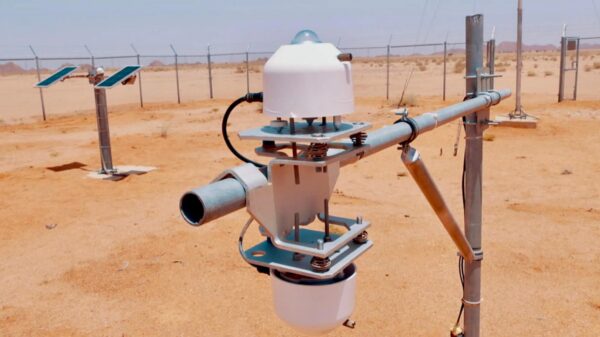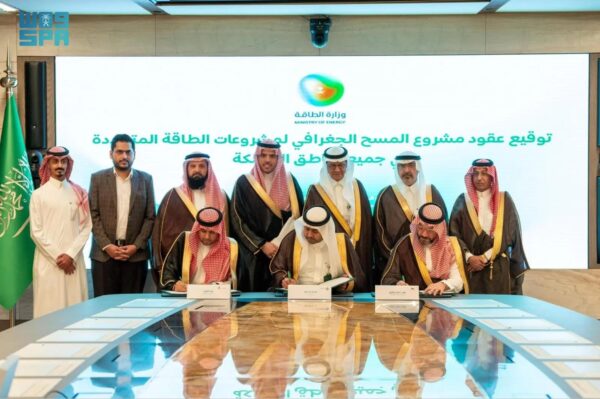Saudi Arabia has launched what it describes as an unprecedented geographic survey project for renewable energy sites.
The Saudi minister of energy, Prince AbdulAziz bin Salman bin AbdulAziz Al Saud, said in a statement that the survey project — part of the National Renewable Energy Program — was globally unprecedented in scope, noting that it encompassed more than 850,000 square kilometers throughout all regions of the country, excluding populated areas, sand dune regions and airspace restricted sites. The entire area to be surveyed is roughly equivalent to the size of the UK and France combined, or Germany and Spain combined, the minister noted. He indicated that no other country in the world had previously conducted a geographic survey of this kind on such a scale.
The project will contribute to identifying the best sites to develop renewable energy projects in the country's regions in terms of the size of renewable energy resources and the priority of developing these projects, Prince Abdulaziz added.
Saudi companies contracted for the project will install 1,200 stations across all regions of the kingdom to measure solar and wind energy.
In the first phase, the stations will survey the designated areas spreading into all regions of the country to identify suitable sites for renewable energy projects. Subsequently, the project’s stations will be moved to these sites and installed there to continuously provide all required data for implementing renewable energy projects with high accuracy.

Solar energy measurement stations, equipped with advanced measurement devices at ground level, will record direct normal irradiance (DNI), global horizontal irradiance (GHI), diffuse horizontal irradiance (DHI), dust and pollutant deposition rates, ground-reflected radiation (albedo), ambient temperature, rainfall levels, relative humidity, and atmospheric pressure.
In addition, wind energy measurement stations, which will be installed at different heights, up to 120 meters, will record wind speed and direction, ambient temperature, atmospheric pressure, and relative humidity.
Data collection will be conducted using the latest technologies and applying the highest quality standards and global practices, the minister stressed.
The project includes the establishment of an energy ministry platform to record and transmit measurement data around the clock, so that it can be analyzed and processed digitally, using artificial intelligence technologies, to assess and rank sites based on their suitability for renewable energy projects.
Prince Abdulaziz noted that the accuracy and continuous updating of the project’s data made it financeable in accordance with the requirements of local and international financial institutions. This will contribute significantly to the immediate allocation of land lots for renewable energy projects and expedite project announcement and execution, after coordination with relevant authorities, he added. It also eliminates the current waiting period of 18 to 24 months to obtain data. The availability of such data reduces the risks related to renewable energy projects implementation, increases such projects’ investment attractiveness, and encourages investors to participate in the development of and investment in renewable energy projects, the minister said.
The project reaffirms the kingdom's commitment to achieving its ambitious targets for producing and exporting renewable energy, as it will optimize the utilization of renewable energy resources across the country, support its strategic position in exporting electricity generated from renewable resources, and promote the kingdom's aim to produce clean hydrogen, the minister emphasized.
In addition, it will primarily contribute to achieving the optimal energy mix targets for electricity production, with renewable energy sources comprising about 50% of the energy mix by 2030, and to achieving the goals of the country's Liquid Fuel Displacement Program by reducing dependence on liquid fuel in electricity generation.
Beginning this year, Saudi Arabia will tender new renewable energy projects with a capacity of 20 GW annually, aiming to reach between 100 and 130 GW by 2030, depending on electricity demand growth.

This content is protected by copyright and may not be reused. If you want to cooperate with us and would like to reuse some of our content, please contact: editors@pv-magazine.com.



By submitting this form you agree to pv magazine using your data for the purposes of publishing your comment.
Your personal data will only be disclosed or otherwise transmitted to third parties for the purposes of spam filtering or if this is necessary for technical maintenance of the website. Any other transfer to third parties will not take place unless this is justified on the basis of applicable data protection regulations or if pv magazine is legally obliged to do so.
You may revoke this consent at any time with effect for the future, in which case your personal data will be deleted immediately. Otherwise, your data will be deleted if pv magazine has processed your request or the purpose of data storage is fulfilled.
Further information on data privacy can be found in our Data Protection Policy.